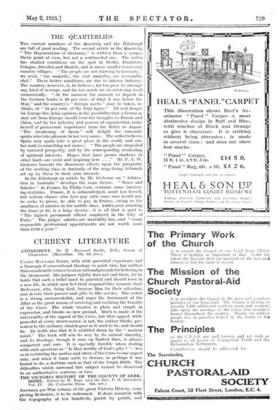THE QUARTERLIES
THE current numbers of the Quarterly and the Edinburgh are full of good reading. The second article in the Quarterly, " The Regeneration of Germany," is written from a sympa- thetic point of view, but not a sentimental one. The writer has studied conditions on the spot in Berlin, Frankfort, Cologne, Dresden and Munich, and in many smaller towns and
country villages. " The people are not starving in Germany," we read, ",the majority, the vast majority, are reasonably clad." These better conditions are due to intense industry,. The country, however, is, he believea, far too poor to attempt any kind of revenge, and far too much set on retrieving itself economically. " At the moment the amount on deposit in the German banks is 30 per cent. of what it was before the War," and the country's " foreign assets " may be taken, he thinks, at " 18 per cent. of the 1923 figure." All real danger for Europe lies, in his opinion, in the possibility that a Germaay shut out from Europe should turn her thoughts to Russia and China, and by her industry and powers of organization make herself of paramount importance from the Baltic to Japan. "The Awakening of Spain " will delight the romantic spirits who take pleasure in her very name. The writer believes Spain may again take a great place in the world, and owe her rank to something not money. " The people are unspoiled by national prosperity, and by the corresponding weakening of spiritual interests. Hopes that have grown shadowy in other lands are vivid and inspiring here . . ." Mr. F. A. W. Gisborne laments the disastrous effects upon the prosperity of the working class in Australia of the wage-fixing tribunals set up by them in their own interest.
In the Edinburgh an article by Mr. Gisborne on " Arbitra- tion in Australia " develops the same theme. " Taxes and Salaries " in France, by Philip Carr, contains some interest- ing statistics. France, it is acknowledged, must tax herself, but certain classes who here pay with some ease would not, he seeks to prove, be able to pay in France, owing to the smallness of salaries in the middle class. £400 a year, counting the franc at 90, is a large income—it is all that is paid to " The highest permanent official employed in the City of Paris." The judges' salaries are incredibly low, and " many responsible professional appointments are not worth more than £130 a year."










































 Previous page
Previous page